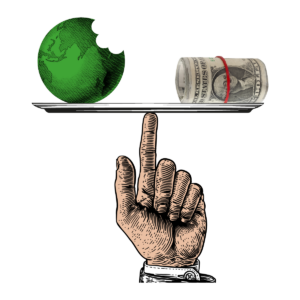Tackling Tax Avoidance
Governments need tax revenues to provide vital public goods and services like education, healthcare and essential infrastructure. But many corporations go to lengths to avoid paying their fair share of taxes, depriving governments of this essential revenue.
At SOMO, we expose the aggressive tax avoidance strategies of companies and the impacts of tax avoidance on human rights and public interests. We examine the international and national tax regimes that make corporate tax avoidance possible, with particular attention to the role of the Netherlands as a leading tax haven.

Taxation plays a pivotal role in the sustainable development of society, serving as a primary and crucial source of financing. However, there are affluent individuals, financial institutions, and multinational corporations that use tax avoidance techniques and tax havens to evade or minimise their tax obligations.
Shareholder value and the interests of large corporations drive today’s economic system: the impetus to maximise profits often ignores the social and environmental costs. Corporate tax avoidance shifts the tax burden to workers, consumers, and small companies, contributing to global economic inequality and stunting economic and social development. Governments like those of the Netherlands deprive countries in the Global South of much-needed tax revenues by facilitating tax avoidance practices.
Our research reveals how the current economic and financial system perpetuates economic inequality and exacerbates the power imbalance between the private sector and civil society. Our advocacy work aims to directly intervene in this broken system through pushing for tax justice and policy change that benefits humanity rather than corporations.
Highlighted Publications
-
How Mozambique’s tax treaties enable tax avoidance Published on:
 Jasper van TeeffelenPosted in category:Publication
Jasper van TeeffelenPosted in category:Publication Jasper van Teeffelen
Jasper van Teeffelen
-
Keep watching Published on:
 Maarten HietlandPosted in category:Publication
Maarten HietlandPosted in category:Publication Maarten Hietland
Maarten Hietland
-
A fox in the henhouse Published on:
 Vincent KiezebrinkPosted in category:Publication
Vincent KiezebrinkPosted in category:Publication Vincent Kiezebrink
Vincent Kiezebrink
The Netherlands as a tax haven
Under existing global regulations, multinational corporations can exploit the gaps within different countries’ legal systems, manipulating global profits to minimise their tax liabilities. This practice has particularly detrimental consequences for countries in the Global South.
The Netherlands is a major facilitator of these tax avoidance practices, often being characterised as a tax haven. The country’s tax treaty network allows foreign companies to avoid taxes in the countries where they do business, while the Netherlands’ tax regime offers them various tax advantages. Altogether, this allows multinational corporations to pay minimal or no taxes.
At SOMO, we conduct research to evaluate the effectiveness of various Dutch and international policy measures to curb tax avoidance, and we expose cases of corporate tax avoidance. We use this research to advocate for effective policy change at both the domestic and international level to work towards building a fairer global tax system for all.

Tax avoidance in the tech, extractive and pharmaceutical industries
Multinational corporations employ intricate networks of mailbox companies in tax havens to manipulate profits and circumvent their tax obligations. This practice is particularly common within the tech, extractive and pharmaceutical sectors, thus, these industries are the focus of much of our tax research at SOMO.
To give just one example: Our research reveals extensive tax avoidance practices within Mozambique’s extractive industries. Exploiting the tax treaties between Mozambique and tax havens such as Mauritius and the United Arab Emirates (UAE), five prominent gas and mining companies – including TotalEnergies, Eni, and Vale – are estimated to be avoiding up to US$ 2.1 billion in taxes owed to Mozambique. This amounts to as much as 67 percent of the country’s public spending in 2021. If these multinational companies did not avoid paying these taxes, Mozambique would have the potential to allocate funds equivalent to 3.5 times its annual education budget – or nearly double its 2021 expenditure on public healthcare.
Tax avoidance is not limited to the extractive industry alone. Approximately 75 percent of the income generated by big pharmaceutical companies is reported offshore for tax purposes. Even compared to other multinational corporations, the extent of profit shifting within the pharmaceutical industry is remarkable. For example, in 2020 our research exposed how the biotech giant Qiagen, one of the leading producers of Coronavirus testing kits, avoided €142 million in Dutch corporate income tax.
Pharmaceutical tax avoidance
Tax avoidance in the pharmaceutical industry is extreme. Discover our investigations into the development of pharmaceutical drugs, as we are aiming to secure public funding and promoting transparency.

As for the tech industry, media companies like Disney, Netflix and ViacomCBS produce digital content such as television shows, movies and subscription channels which are represented as intangible assets on the balance sheet. Companies that rely on intangible assets can easily shift a large part of their global profits to tax havens, where most of their profits remain untaxed.
-
ViacomCBS (pdf, 455.54 KB)
Coalitions for change and tax justice
At SOMO, we are the host of Tax Justice Netherlands (opens in new window) – a collective of eight Dutch civil society organisations and trade unions. The collective is dedicated to promoting a globally equitable tax system and advocating enhanced transparency from companies and governments. As a member of the Global Alliance for Tax Justice(opens in new window) and Tax Justice Europe(opens in new window) , Tax Justice Netherlands actively engages in initiatives concerning taxation.
SOMO is also a member of F4All, through which we actively organise tax research and advocacy training sessions in partnership with counterparts in the Global South and with Oxfam Novib in the Netherlands, facilitating knowledge exchange and capacity building on tax-related issues.
SOMO also regularly works in collaboration with various partners in the Global South, such as Tax Justice Network Africa, CDD (Centre for Democracy and Development) in Mozambique, AIDC (Alternative Information and Development Centre) in South Africa, and many others.
Through our research, we aim to explore avenues for enhancing cooperation with local, regional, and global civil society organisations to bolster their advocacy efforts. It is crucial that our research aligns with the concerns and campaigning agendas of the wider tax justice movement, to ensure we all have as much positive impact as possible.
Do you need more information?
-

Vincent Kiezebrink
Researcher -

Jasper van Teeffelen
Researcher
Latest updates
-
 How much of Shell’s 2022 record profits will be registered in tax havens? Probably quite a lot.Posted in category:News
How much of Shell’s 2022 record profits will be registered in tax havens? Probably quite a lot.Posted in category:News Jasper van TeeffelenPublished on:
Jasper van TeeffelenPublished on: -
 Moderna vaccine profits channelled to tax havensPosted in category:News
Moderna vaccine profits channelled to tax havensPosted in category:News Vincent KiezebrinkPublished on:
Vincent KiezebrinkPublished on: -
 Tax treaties deprive Mozambique of hundreds of millions of US dollarsPosted in category:News
Tax treaties deprive Mozambique of hundreds of millions of US dollarsPosted in category:News Jasper van TeeffelenPublished on:
Jasper van TeeffelenPublished on:
Related Topics
Discover more of SOMO’s work and publications.





